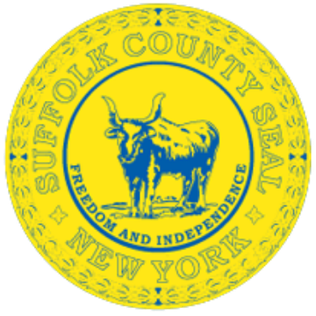Many municipalities across the country have already banned coal tar sealant, a toxic asphalt product. We need Suffolk County Executive Steve Levy to sign Resolution NO. 1162-2011, banning the sale and use of this toxin in Suffolk County. This is an important step for protecting public health and the health of our rivers, bays, and estuaries. Coal tar sealant is unnecessary and a poison to our marine ecosystems and our economic health.
Coal tar sealant is commonly used in parking lots to “beautify” asphalt every few years. Within just a few months, applied coal tar sealant is worn away and scraped off by car tires. This product contains high amounts of carcinogenic PAHs (polycyclic aromatic hydrocarbons) and is constantly being washed into our rivers, bays, and estuaries, negatively affecting both marine and human life.
Health Risks and Dangers of PAHs
For marine life:
Death
Fin erosion
Liver abnormalities
Immune system impairments leading to increased susceptibility to disease
For humans:
Known carcinogen
Prenatal exposure linked to premature birth, decreased childhood IQ scores, heart malformations, and childhood asthma
A USGS study found that storm water runoff from parking lots using coal tar sealant contained 65 times higher concentrations of PAHs than runoff from those that did not use sealant. The public is exposed to toxic PAHs in the sealcoat through skin contact, inhalation of wind-blown particles, and inhalation of fumes that volatilize.
How you can help:
Call the office of Suffolk County Executive Steve Levy at 631-853-4000.
Tell him to sign Resolution NO. 1162-2011 to ban toxic coal tar sealant to protect public and marine ecosystem health!
Remind him that banning coal tar sealant will help protect important jobs in the marine trades and commercial and recreational fishing by protecting our marine resources.
Remember to include your full name and zip code in the message.
It takes only a few minutes to call and let County Executive Levy know that banning coal tar sealant will fulfill his duty to protect our public health, our economic well-being, and our environment.
Thank you for taking action. Together we make a difference!
Sincerely,
YOUR FRIENDS AT CCE
Citizens Campaign for the Environment
225A Main Street
Farmingdale, NY 11735
Phone: 516-390-7150 | Fax: 516-390-7160
6 Regional Offices in New York and Connecticut
Related articles
- Broad Coalition Urges Suffolk County Legislators to Oppose Prepaid Cell Phone Registry (www.onthewilderside.com)
Filed under: News Tagged: | Coal tar, Polycyclic aromatic hydrocarbon, Suffolk County, Suffolk County New York, Surface runoff, united states


 .
.





This in inaccurate! I am an advocate for protecting our environment; I organize several neighborhood clean-up projects and became a vegan, primarily due to the environmental impact of both producing animal products and cooking them. Did you know that simply barbequing a piece of meat or chicken produces and lets off more PHA’s than sealing an entire parking lot?
Additionally, you mentioned “many municipalities across the country have already banned this product”, actually it is a very small number, under a dozen and most of those municipalities reserved kick-backs for doing this. And in one municipality, when the water was tested 3 years later, there had been NO DIFFERENCE in the PHA levels than prior to the ban.
I think that one of the reasons environmentalists are not taken seriously enough, is that many times they rush to take a stand, without actually having the correct facts to back up what they re trying to support. I moved off of the island 12 years ago and moved to Colorado. I moves back here two years ago and I have been so disgusted by the filth on this island. Everywhere you look, there is liter and cigarette butts on the ground. I have also noticed that several large events, such as the “Cow Harbor Race” hold events and do not even bother with recycling bins. Why don’t you focus on taking simple steps to try to change the health of the island and expand the resident’s minds on environmental issues, before rushing to Ban something that is really not a proven issue. This is an example of trying to do something that is considering to protect the environment, that has no real impact, rather than doing the harder work that WILL make a difference!